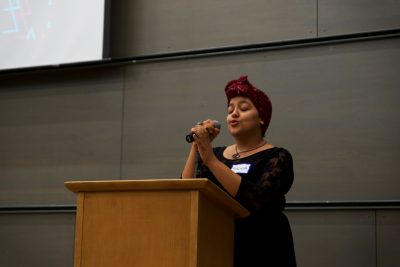
Sophia Gordon Hall at Tufts University was filled with poetry, song, dancing and celebration on Saturday night, as students and faculty members united to celebrate black Muslims in art.
“Black Muslims in the Arts” was a two-hour event planned by Tufts sophomores Sara Arman and Muna Mohamed, through the Africana Center and Muslim Students Association, and consisted of Tufts students who volunteered to perform poetry and music dedicated to their black Muslim identity.
“Black Muslims are always put in a binary of being victims of Islamophobia or racism, and black Muslims exist so much outside of those categories,” Arman said. “We want to show that black Muslims exist and should be celebrated.”
In addition to organizing the performances, Arman and Mohamed contacted local black Muslim business owners to sponsors, whose businesses include Ashur Restaurant, a classic African and Middle Eastern restaurant in Roxbury, and Saffiyah Botanicals Holistic Care, LLC, a home and personal care line.
It was initially difficult to find these business owners, they said. Each attendee received a list of local black Muslim artists and businesses they could support by purchasing their art, food and hair care products.
But attendees included both Muslim and non-Muslim students who wished to come together to create a safe space.
“An increase in Islamophobia and anti-blackness that comes with these changing times makes it important for the community to come together,” said Shani Asiko, a sophomore at Tufts University. “I don’t identity as Muslim but I know from speaking to my black Muslim friends that it’s really difficult for them to find safe spaces.”
Asiko continued to explain her friends’ struggle to find validation “in their blackness and being Muslim,” stressing the importance of coming together and sharing experiences.
Mohamed said she wanted to stress the importance of celebrating black and Muslim culture rather than focusing on the negatives of those identities. It’s important to showcase black Muslim art because it’s an integral way of expression, when everything else works to erase their identity, Mohamed said.
“Black Muslim culture is important because we exist,” Mohamed said. “People often think of a certain face when they hear Muslim and that face isn’t often black.”
Among the performances was a song performed by a Moroccan exchange student from Spain and a collective Chance the Rapper sing-along, which culminated the event.
“I think having a space for people to showcase their art is really good way to set a common ground,” said Sagal Alisalad, a sophomore at Tufts. “Everyone can have their interests out there and it’s good to have an open forum where people can share their own work and create a welcoming space where everyone enjoys living in the moment together. I’m black and a Muslim so it was a really good thing to be a part of.”
But the black Muslim population at Tufts is small. According to a Fall 2016 Tufts University survey, 1.7 percent of students who responded to the survet identified as Muslim.
“Black culture at Tufts is Christian-dominated, but it’s important to remember that black Muslims are here and that’s a culture worth celebrating,” Arman said. “One of the most important things to consider is that the first Muslims in America were black and were brought during the slave trade.”
The night emphasized the prevalence of black Muslim artists within American culture, such as rappers Mos Def, Busta Rhymes and T-Pain.
“Art in many ways is a very personal thing and through art you can portray experiences and emotions that may be more difficult for other people to access in other ways,” Asiko said.
Despite the current political climate, which attendees said is difficult for Muslims and other marginalized groups, the organizers said they would support the showcasing of black Muslim art regardless of current events. They said that there needs to be extra support and love for the black and Muslim community.
“Art touches people in a very unique way,” Asiko said, “and even if you haven’t had the experiences that someone might be talking about or sharing through their art, there’s still a level of empathy that you access and get involved with when you appreciate it.”






















































































































